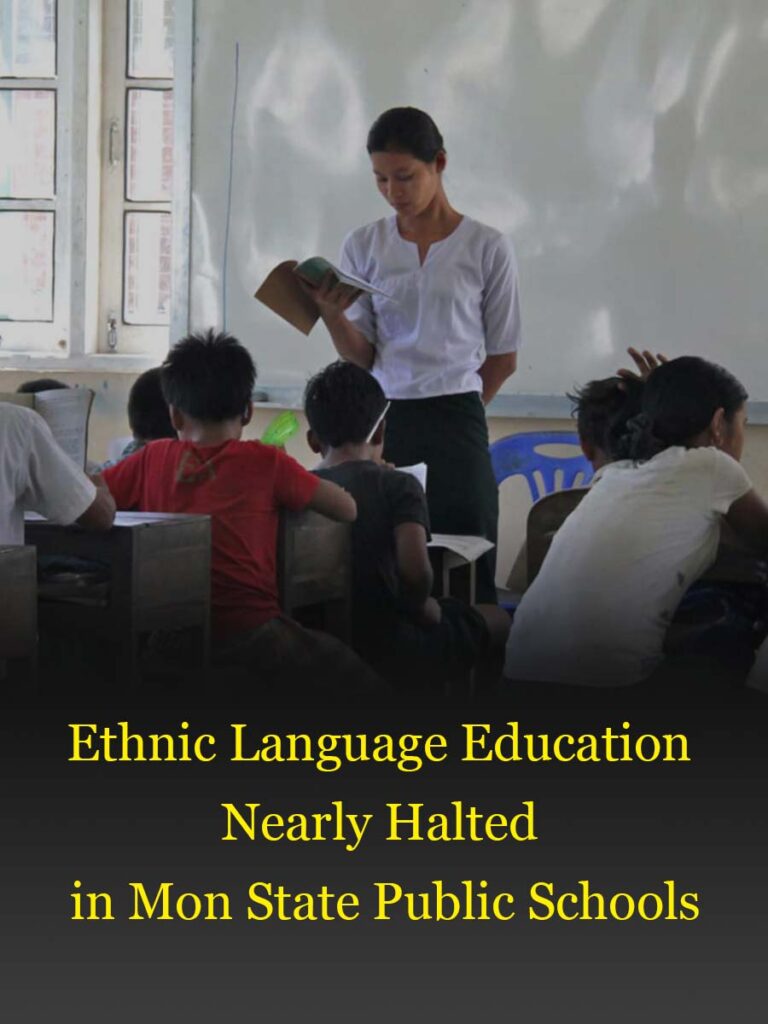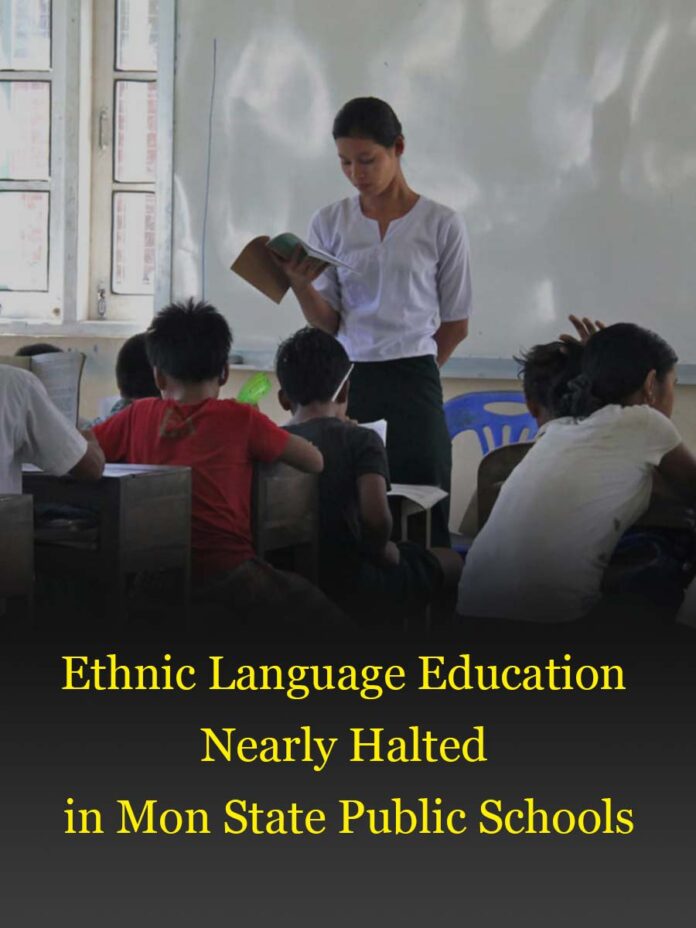Ethnic language instruction in public basic education schools across Mon State is nearing a complete halt due to a shortage of Mon, Karen, and Pa-O ethnic language teachers, according to reports from local education staff under Myanmar’s military council.
Many schools in Kyaikmaraw, Mudon, Thanbyuzayat, and Ye townships have suspended ethnic language teaching due to an inability to replace teachers who have left the profession for various reasons. Despite annual recruitment efforts for Teaching Assistant (TA) and Language Teacher (LT) roles, local education offices have reportedly received few to no applications.
“With a salary of only 100,000 kyats, no one is willing to teach anymore. Out of six schools in our village, only three are able to continue ethnic language classes this year. Even though they announce vacancies every year, no one is applying,” said one education official.
A representative from the Mon State Department of Ethnic Affairs under the military council told IMNA that applicants for TA roles from previous years will be invited to training in September, after which they will be deployed to schools with urgent needs.
“There will be many replacements needed. Training is scheduled for September. Those who applied last year will be included. But there won’t be any hiring in June, July, or August,” the official explained.

Low Pay, Limited Benefits, and Discrimination Drive Teachers Away
Ethnic language instructors report the highest resignation rates this academic year, citing insufficient pay, lack of benefits, and workplace discrimination.
Some teachers have opted to switch career paths, aiming for more permanent roles with pension eligibility by applying through the government’s PPTT pathway and becoming assistant primary school teachers.
In addition to teaching ethnic languages, many ethnic instructors also cover other subjects in their schools. As of 2021, TAs earn 130,000 kyats and LTs earn 60,000 kyats per month. However, these salaries exclude compensation for weekends, public holidays, and long school breaks. Teachers also lack subsidies and other basic benefits.
Despite pride in preserving their culture and language, some Mon teachers fear that without long-term guarantees, ethnic language instruction in public schools is at risk of disappearing.
“Although the Union government presents this program as inclusive, Mon and other ethnic languages are treated like domestic help in the education system. In reality, we’re like servants under the control of the elite,” one teacher stated.
While some support has come from parent communities to supplement teacher income, it is not sustainable in the long run.
The Ethnic Affairs Department says it is negotiating with the Ministry of Education to improve salaries and benefits, and that changes may come within this academic year.
Sustaining Ethnic Language Education Requires Community Support
For ethnic language education to survive long-term, community-based support from national education groups, local activists, and parents is critical. Currently, the Mon Literature and Culture Committee is only helping language teachers to be promoted to TA roles, with no broader support mechanisms in place.
In some areas, such as Ye Township, local administrators, monks, and parent-teacher associations are working together to keep the programs running. But in other villages, community leaders and monks are disengaged, leading to the closure of many schools offering ethnic language classes.
A Ye resident said, “If one teacher can no longer teach, we find someone else to take over for a year. That’s how we keep going. But not every village is like that. In some places, local leaders don’t care, and even the monks refuse to support the program.”
Due to the lack of new Mon textbooks, teachers rely on photocopied materials, often funded by local donations.
Elective Status and Limited Time Undermine Effectiveness
Language Teachers typically teach 45-minute sessions, totaling five hours per week. Ethnic language instruction is still considered an elective subject, usually offered only in the early primary grades (KG to Grade 5), and even then, not all students are required to participate.
Because the subject is optional and offered for limited hours, interest among students is low, and outcomes are often ineffective. A Mon cultural educator noted that the limited class time and competing duties affect teaching quality and impact.
“Classes last just 45 minutes to an hour. Teachers have too many responsibilities, so the quality suffers. We rarely see results. School administrators and parents need to be more involved,” the educator said.
He added that ethnic language instruction should be made a required subject, with dedicated time and proper evaluation, to help students develop listening, speaking, reading, and writing skills in their mother tongues.
Ethnic activists, monks, and civil society groups who fought hard for the right to teach ethnic languages caution that hard-won progress should not be lost and urge collective action to preserve these programs.
A History of Struggles and Setbacks
After the 1988 pro-democracy uprising, ethnic languages were entirely banned from government schools in Myanmar’s southern regions. Mon and other ethnic children were denied the right to learn their mother tongues.
It wasn’t until the National League for Democracy (NLD)-led government took power in 2015 that limited ethnic language instruction was allowed outside regular school hours.
Since then, ethnic language instruction has gradually expanded, with the number of schools and students steadily increasing. However, the 2021 military coup and the ensuing conflict have reversed some of this progress, creating new challenges around safety and livelihoods.
For the 2024–2025 academic year, official data shows that 270 schools teach Mon, 273 teach Karen (Sgaw and Pwo), and about 30 offer Pa-O language classes in Mon State. However, instruction is largely limited to early grades and often unavailable at home, leading to generational loss of language fluency.
The Right to Preserve Language and Culture
The Universal Declaration of Human Rights explicitly recognizes the right of ethnic groups to preserve, teach, and promote their languages and cultures. Yet, many ethnic communities in Myanmar are still denied these rights.
Incorporating ethnic languages and cultures into the national curriculum is not only a human right—it is key to achieving equity in education. Experts from Myanmar’s education reform networks have also emphasized that mother tongue instruction improves literacy outcomes.
However, ongoing political conflict, school closures, and the paralysis of religious and educational institutions are major obstacles to protecting ethnic language education in Myanmar.
According to a 2018 UNESCO report, more than 20 of Myanmar’s over 100 indigenous languages are on the verge of extinction.

